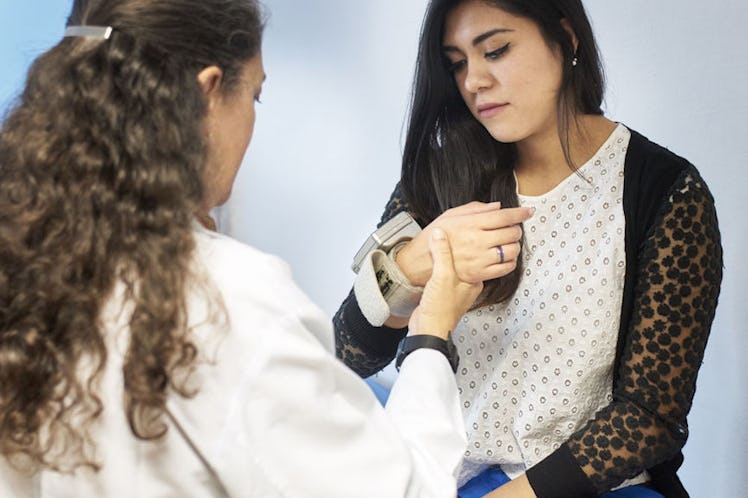
Here’s How To Find A Primary Care Doctor If You Legit Have No Idea Where To Start
The first time I tried to find a primary care doctor on my own in Washington D.C., I was shocked by the wait times for appointments. After calling several doctors' offices, each one told me it would take six weeks or so to be seen for a new patient appointment. Perhaps this situation presents itself differently in other cities, but from what I've gathered, this is, unfortunately, pretty standard. If you're wondering how to find a primary care doctor, there are several little factors like this that you might not realize you'll have to deal with until you're knee-deep in your search.
BTW, if going to the doctor at all makes you feel a little anxious, girl, I totally get it. For me, even if I feel like I'm in perfect health, there's something about going to the doctor's office that feels like I'm taking a huge test. Plus, I'm always a little nervous that I might not turn out to be as healthy as I think I am.
But finding a regular doctor who can be a great resource for any medical questions you might have is important. If you're a little unsure about how to start, don't worry — I got you. With a little bit of preparation and some light googling, you'll be sure to find the right doctor for your needs.
Understand Your Insurance Situation
If you don't currently have coverage, please don't think that means you can't see a doctor at all, because that's simply not true. It just means you have to fine-tune your search a little more.
For instance, a tool from Healthcare.gov allows you to search (for free) for low-cost community health centers near you. These places typically charge on a sliding scale according to your income, meaning you can have access to things like prenatal care, general primary care, and referrals for specialized health issues, all at a fraction of the total cost of the appointment. Your local Planned Parenthood could also be a great resource for finding affordable health care without insurance.
If you want health insurance, but don't have a job that offers benefits, you can apply for federal 2019 coverage from Nov. 1 through Dec. 15 at Healthcare.gov. If you do have health insurance through a parent or your own job, read your coverage policy so that you understand what exactly is covered, and what you might have to pay for out of pocket.
Consider Your Priorities
Do you want a doctor whose office is as close to you as possible? Are you looking for a doctor who's fluent in another language, if English isn't your first language? Is the gender identity of your doctor important to you? Do you want an LGBTQIA+ friendly physician?
Thinking about the answers to these questions, as well as any other ones that are specific to you, will help you narrow down the number of physicians in your area so you can find someone who makes you feel safe, comfortable, and supported.
Ask Around
Whether it's for the best tacos around or the movie theaters that offer occasional ticket discounts, I love crowdsourcing for recommendations from my friends, and this same strategy could be helpful for finding a doctor.
Blue Cross Blue Shield recommends first checking with people you already know; ask a friend or a co-worker you trust if they have a primary care physician that they love. If you're about to move somewhere different, see if your current doctor can suggest someone they're connected with in your new area.
Search Using Your Health Care Provider
If you do have health insurance, a great place to start is on your health care provider's website. Logging onto this platform will let you see exactly which physicians accept your specific insurance plan.
The only downfall of searching this way is that it generally doesn't allow you to book an appointment directly from the website, but it will have all of your individualized coverage information easily available, so at least you won't have to worry about digging around for those details.
Use An Independent Website
For a do-it-all-in-one web search, I highly recommend a website called Zocdoc to help you find and book appointments. Once you put in your insurance information, you can find doctors near you that accept that plan, and you can choose a time slot that works for your schedule.
Since you don't have to call the doctor's office directly to set something up on Zocdoc, the platform not only cuts out some extra work on your behalf, but also gives you a place to store a lot of your important health care information.
Gather All Of Your Medical Records
According to the Palo Alto Medical Foundation, it could save you a lot of time during your first primary care appointment if you come prepared with your immunization record and medical history. You can have your pediatrician's office fax these forms to your new doctor's office ahead of time, or you can request hard copies for your own records.
Prepare Any Concerns You Have Ahead Of Time
If you haven't noticed any particular health issues bothering you, you can skip this step. But if something about your body feels off, make sure you come to your doctor appointment prepared to talk about it. Before the appointment, keep track of any symptoms you're experiencing so that it will be easy to bring these things up once you're in your doctor's office.
When it comes to your health, no concern is too trivial, so make sure you take full advantage of the time you have with your primary care doctor to address any issues on your mind. This way, you and your physician can work together to help you become the healthiest version of yourself.